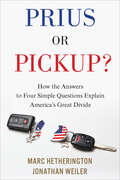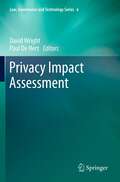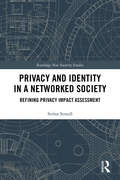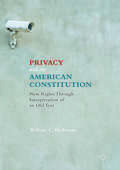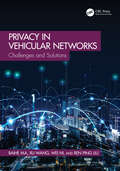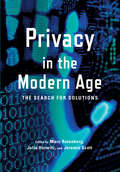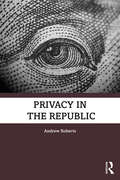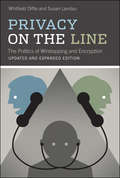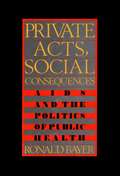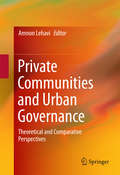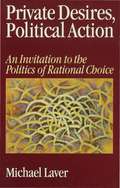- Table View
- List View
Prius Or Pickup?: How the Answers to Four Simple Questions Explain America's Great Divide
by Marc Hetherington Jonathan Weiler“In this fascinating look at contemporary politics, [the authors] set out to explain what really causes the extreme political polarization seen today.” —Publishers WeeklyWhat’s in your garage: a Prius or a pickup? What’s in your coffee cup: Starbucks or Dunkin’ Donuts? What about your pet: cat or dog? As award-winning political scholars Marc Hetherington and Jonathan Weiler explain, even our smallest choices speak volumes about us—especially when it comes to our personalities and our politics. Liberals and conservatives seem to occupy different worlds because we have fundamentally different worldviews: systems of values that can be quickly diagnosed with a handful of simple questions, but which shape our lives and decisions in the most elemental ways. If we’re to overcome our seemingly intractable differences, Hetherington and Weiler show, we must first learn to master the psychological impulses that give rise to them, and to understand how politicians manipulate our mindsets for their own benefit.Drawing on groundbreaking original research, Prius or Pickup? provides the psychological key to America’s deadlocked politics, showing that we are divided not by ideologies but something deeper: personality differences that appear in everything from politics to parenting to the workplace to TV preferences, and that would be innocuous if only we could decouple them from our noxious political debate. “A fascinating way to look at the fracturing of a nation.” —Kirkus Reviews“An exceptionally insightful and entertaining exploration of the roots of tribalism in American (and European) society and politics, and its ominous consequences for democracy.” —Thomas E. Mann, Senior Fellow, Brookings Institution
Privacy Impact Assessment
by David Wright Paul De HertVirtually all organisations collect, use, process and share personal data from their employees, customers and/or citizens. In doing so, they may be exposing themselves to risks, from threats and vulnerabilities, of that data being breached or compromised by negligent or wayward employees, hackers, the police, intelligence agencies or third-party service providers. A recent study by the Ponemon Institute found that 70 per cent of organisations surveyed had suffered a data breach in the previous year. Privacy impact assessment is a tool, a process, a methodology to identify, assess, mitigate or avoid privacy risks and, in collaboration with stakeholders, to identify solutions. Contributors to this book - privacy commissioners, academics, consultants, practitioners, industry representatives - are among the world's leading PIA experts. They share their experience and offer their insights to the reader in the policy and practice of PIA in Australia, Canada, New Zealand, the United Kingdom, the United States and elsewhere. This book, the first such on privacy impact assessment, will be of interest to any organisation that collects or uses personal data and, in particular, to regulators, policy-makers, privacy professionals, including privacy, security and information officials, consultants, system architects, engineers and integrators, compliance lawyers and marketing professionals. In his Foreword, surveillance studies guru Gary Marx says, "This state-of-the-art book describes the most comprehensive tool yet available for policy-makers to evaluate new personal data information technologies before they are introduced." This book could save your organisation many thousands or even millions of euros (or dollars) and the damage to your organisation's reputation and to the trust of employees, customers or citizens if it suffers a data breach that could have been avoided if only it had performed a privacy impact assessment before deploying a new technology, product, service or other initiative involving personal data.
Privacy Rights: Moral and Legal Foundations
by Adam D. MooreWe all know that Google stores huge amounts of information about everyone who uses its search tools, that Amazon can recommend new books to us based on our past purchases, and that the U.S. government engaged in many data-mining activities during the Bush administration to acquire information about us, including involving telecommunications companies in monitoring our phone calls (currently the subject of a bill in Congress). Control over access to our bodies and to special places, like our homes, has traditionally been the focus of concerns about privacy, but access to information about us is raising new challenges for those anxious to protect our privacy. In Privacy Rights, Adam Moore adds informational privacy to physical and spatial privacy as fundamental to developing a general theory of privacy that is well grounded morally and legally.
Privacy Rights: Moral and Legal Foundations
by Adam D. MooreWe all know that Google stores huge amounts of information about everyone who uses its search tools, that Amazon can recommend new books to us based on our past purchases, and that the U.S. government engaged in many data-mining activities during the Bush administration to acquire information about us, including involving telecommunications companies in monitoring our phone calls (currently the subject of a bill in Congress). Control over access to our bodies and to special places, like our homes, has traditionally been the focus of concerns about privacy, but access to information about us is raising new challenges for those anxious to protect our privacy. In Privacy Rights, Adam Moore adds informational privacy to physical and spatial privacy as fundamental to developing a general theory of privacy that is well grounded morally and legally.
Privacy and Identity in a Networked Society: Refining Privacy Impact Assessment (Routledge New Security Studies)
by Stefan StraußThis book offers an analysis of privacy impacts resulting from and reinforced by technology and discusses fundamental risks and challenges of protecting privacy in the digital age. Privacy is among the most endangered "species" in our networked society: personal information is processed for various purposes beyond our control. Ultimately, this affects the natural interplay between privacy, personal identity and identification. This book investigates that interplay from a systemic, socio-technical perspective by combining research from the social and computer sciences. It sheds light on the basic functions of privacy, their relation to identity, and how they alter with digital identification practices. The analysis reveals a general privacy control dilemma of (digital) identification shaped by several interrelated socio-political, economic and technical factors. Uncontrolled increases in the identification modalities inherent to digital technology reinforce this dilemma and benefit surveillance practices, thereby complicating the detection of privacy risks and the creation of appropriate safeguards. Easing this problem requires a novel approach to privacy impact assessment (PIA), and this book proposes an alternative PIA framework which, at its core, comprises a basic typology of (personally and technically) identifiable information. This approach contributes to the theoretical and practical understanding of privacy impacts and thus, to the development of more effective protection standards. This book will be of much interest to students and scholars of critical security studies, surveillance studies, computer and information science, science and technology studies, and politics.
Privacy and Power
by Miller Russell A.Edward Snowden's leaks exposed fundamental differences in the ways Americans and Europeans approach the issues of privacy and intelligence gathering. Featuring commentary from leading commentators, scholars and practitioners from both sides of the Atlantic, the book documents and explains these differences, summarized in these terms: Europeans should 'grow up' and Americans should 'obey the law'. The book starts with a collection of chapters acknowledging that Snowden's revelations require us to rethink prevailing theories concerning privacy and intelligence gathering, explaining the differences and uncertainty regarding those aspects. An impressive range of experts reflect on the law and policy of the NSA-Affair, documenting its fundamentally transnational dimension, which is the real location of the transatlantic dialogue on privacy and intelligence gathering. The conclusive chapters explain the dramatic transatlantic differences that emerged from the NSA-Affair with a collection of comparative cultural commentary.
Privacy and the American Constitution
by William C. HeffernanThis book explains a paradox in American constitutional law: how a right not discussed during the ratification debates at Philadelphia and not mentioned in the text has become a core component of modern freedom. Rather, privacy is a constitutional afterthought that has gained force through modern interpretations of an old text. Heffernan defends privacy rights against originalist objections to its inclusion in modern constitutional doctrine, analyzes the structure of privacy claims, and provides a blueprint for protecting privacy against government incursion. The book will appeal to a wide audience of students and researchers of criminal procedure, constitutional history, law-and-society, and sociology of law. Lawyers will find this book extremely valuable in addressing the statutory issues associated with modern privacy law. At last, a book about constitutional interpretation that speaks plain English and makes sense. It's the best work I know on the subject, yet that subject is not the one it's mostly about. The book mostly tells the story of the constitutional right to privacy and how it emerged from provisions that at the outset were not much about privacy at all. On that subject, the book is definitive. It's also fascinating, probing, engaging, insightful, and wonderfully presented. Privacy and the American Constitution is a stellar contribution to knowledge. Albert W. Alschuler, Julius Kreeger of Law and Criminology, Emeritus, University of Chicago A powerful and innovate contribution to constitutional law. Not only does Heffernan offer us a fascinating and persuasive account of how modern constitutional rights grew out of the personal space offered to us in an earlier era, he also explains why privacy rights deserve the newfound importance they have in our modern jurisprudence, based upon the same Madisonian approach to constitutional interpretation that justifies other central parts of modern constitutional law. Marc Jonathan Blitz, Alan Joseph Bennett Professor of Law, Oklahoma City University School of Law
Privacy at Risk: The New Government Surveillance and the Fourth Amendment
by Christopher SloboginWithout our consent and often without our knowledge, the government can constantly monitor many of our daily activities, using closed circuit TV, global positioning systems, and a wide array of other sophisticated technologies. With just a few keystrokes, records containing our financial information, phone and e-mail logs, and sometimes even our medical histories can be readily accessed by law enforcement officials. As Christopher Slobogin explains in Privacy at Risk, these intrusive acts of surveillance are subject to very little regulation. Applying the Fourth Amendment’s prohibition on unreasonable searches and seizures, Slobogin argues that courts should prod legislatures into enacting more meaningful protection against government overreaching. In setting forth a comprehensive framework meant to preserve rights guaranteed by the Constitution without compromising the government’s ability to investigate criminal acts, Slobogin offers a balanced regulatory regime that should intrigue everyone concerned about privacy rights in the digital age.
Privacy at Risk: The New Government Surveillance and the Fourth Amendment
by Christopher SloboginWithout our consent and often without our knowledge, the government can constantly monitor many of our daily activities, using closed circuit TV, global positioning systems, and a wide array of other sophisticated technologies. With just a few keystrokes, records containing our financial information, phone and e-mail logs, and sometimes even our medical histories can be readily accessed by law enforcement officials. As Christopher Slobogin explains in Privacy at Risk, these intrusive acts of surveillance are subject to very little regulation. Applying the Fourth Amendment’s prohibition on unreasonable searches and seizures, Slobogin argues that courts should prod legislatures into enacting more meaningful protection against government overreaching. In setting forth a comprehensive framework meant to preserve rights guaranteed by the Constitution without compromising the government’s ability to investigate criminal acts, Slobogin offers a balanced regulatory regime that should intrigue everyone concerned about privacy rights in the digital age.
Privacy in Vehicular Networks: Challenges and Solutions
by Baihe Ma Xu Wang Wei Ni Ren Ping LiuIn an era where vehicular networks and Location-Based Services (LBS) are rapidly expanding, safeguarding location privacy has become a critical challenge. Privacy in Vehicular Networks delves into the complexities of protecting sensitive location data within the dynamic and decentralized environment of vehicular networks. This book stands out by addressing both the theoretical and practical aspects of location privacy, offering a thorough analysis of existing vulnerabilities and innovative solutions.This book meticulously examines the interplay between location privacy and the operational necessities of road networks. It introduces a differential privacy framework tailored specifically for vehicular environments, ensuring robust protection against various types of privacy breaches. By integrating advanced detection algorithms and personalized obfuscation schemes, the book provides a multi-faceted approach to enhancing location privacy without compromising data utility.The key features of this book can be summarized as follows: Comprehensive Analysis: Detailed examination of location privacy requirements and existing preservation mechanisms Innovative Solutions: Introduction of a Personalized Location Privacy-Preserving (PLPP) mechanism based on Road Network-Indistinguishability (RN-I) Advanced Detection: Utilization of Convolutional Neural Networks (CNN) for detecting illegal trajectories and enhancing data integrity Collective Security: Implementation of the Cloaking Region Obfuscation (CRO) mechanism to secure multiple vehicles in high-density road networks Holistic Approach: Joint Trajectory Obfuscation and Pseudonym Swapping (JTOPS) mechanism to seamlessly integrate privacy preservation with traffic management Future-Ready: Exploration of upcoming challenges and recommendations for future research in vehicular network privacy This book is essential for researchers, practitioners, and policymakers in the fields of vehicular networks, data privacy, and cybersecurity. It provides valuable insights for anyone involved in the development and implementation of LBS, ensuring they are equipped with the knowledge to protect user privacy effectively.
Privacy in the Modern Age
by Marc Rotenberg Jeramie Scott Julia HorwitzThe threats to privacy are well known: the National Security Agency tracks our phone calls; Google records where we go online and how we set our thermostats; Facebook changes our privacy settings when it wishes; Target gets hacked and loses control of our credit card information; our medical records are available for sale to strangers; our children are fingerprinted and their every test score saved for posterity; and small robots patrol our schoolyards and drones may soon fill our skies.The contributors to this anthology don't simply describe these problems or warn about the loss of privacy-they propose solutions. They look closely at business practices, public policy, and technology design, and ask, "Should this continue? Is there a better approach?" They take seriously the dictum of Thomas Edison: "What one creates with his hand, he should control with his head." It's a new approach to the privacy debate, one that assumes privacy is worth protecting, that there are solutions to be found, and that the future is not yet known. This volume will be an essential reference for policy makers and researchers, journalists and scholars, and others looking for answers to one of the biggest challenges of our modern day. The premise is clear: there's a problem--let's find a solution.
Privacy in the Republic
by Andrew RobertsThis book rethinks the idea of privacy. It argues that a satisfactory account of privacy should not limit itself to identifying why privacy might be valuable. It also needs to attend to the further question of how it can be secured in those circumstances in which it proves to be valuable. Drawing on republican ideas about the relationship between freedom and self-government, the book asserts that privacy is valuable, because it enables us to lead non-dominated lives. It prevents others from acquiring power to interfere in our choices – to remove options that would otherwise be available to us, and to manipulate our decision-making. It further examines the means through which citizens might exercise effective control over decisions and actions that affect their privacy and proposes a democratic theory of privacy. With the emergence of the ‘surveillance state,’ this volume will be indispensable for scholars, students, and researchers in political theory, political philosophy, law, and human and civil rights. It will be of particular interest to policymakers, lawyers, and human rights activists.
Privacy is Power: Why and How You Should Take Back Control of Your Data
by Carissa VelizAn Economist Book of the Year Every minute of every day, our data is harvested and exploited… It is time to pull the plug on the surveillance economy. Governments and hundreds of corporations are spying on you, and everyone you know. They're not just selling your data. They're selling the power to influence you and decide for you. Even when you've explicitly asked them not to. Reclaiming privacy is the only way we can regain control of our lives and our societies. These governments and corporations have too much power, and their power stems from us--from our data. Privacy is as collective as it is personal, and it's time to take back control. Privacy Is Power tells you how to do exactly that. It calls for the end of the data economy and proposes concrete measures to bring that end about, offering practical solutions, both for policymakers and ordinary citizens.
Privacy on the Line, updated and expanded edition: The Politics of Wiretapping and Encryption
by Whitfield Diffie Susan LandauA penetrating and insightful study of privacy and security in telecommunications for a post-9/11, post-Patriot Act world.Telecommunication has never been perfectly secure. The Cold War culture of recording devices in telephone receivers and bugged embassy offices has been succeeded by a post-9/11 world of NSA wiretaps and demands for data retention. Although the 1990s battle for individual and commercial freedom to use cryptography was won, growth in the use of cryptography has been slow. Meanwhile, regulations requiring that the computer and communication industries build spying into their systems for government convenience have increased rapidly. The application of the 1994 Communications Assistance for Law Enforcement Act has expanded beyond the intent of Congress to apply to voice over Internet Protocol (VoIP) and other modern data services; attempts are being made to require ISPs to retain their data for years in case the government wants it; and data mining techniques developed for commercial marketing applications are being applied to widespread surveillance of the population.In Privacy on the Line, Whitfield Diffie and Susan Landau strip away the hype surrounding the policy debate over privacy to examine the national security, law enforcement, commercial, and civil liberties issues. They discuss the social function of privacy, how it underlies a democratic society, and what happens when it is lost. This updated and expanded edition revises their original—and prescient—discussions of both policy and technology in light of recent controversies over NSA spying and other government threats to communications privacy.
Privacy, Big Data, and the Public Good
by Helen Nissenbaum Julia Lane Victoria Stodden Stefan Bender Julia Lane Victoria Stodden Stefan BenderMassive amounts of data on human beings can now be analyzed. Pragmatic purposes abound, including selling goods and services, winning political campaigns, and identifying possible terrorists. Yet 'big data' can also be harnessed to serve the public good: scientists can use big data to do research that improves the lives of human beings, improves government services, and reduces taxpayer costs. In order to achieve this goal, researchers must have access to this data - raising important privacy questions. What are the ethical and legal requirements? What are the rules of engagement? What are the best ways to provide access while also protecting confidentiality? Are there reasonable mechanisms to compensate citizens for privacy loss? The goal of this book is to answer some of these questions. The book's authors paint an intellectual landscape that includes legal, economic, and statistical frameworks. The authors also identify new practical approaches that simultaneously maximize the utility of data access while minimizing information risk.
Private Acts, Social Consequences: AIDS and the Politics of Public Health
by Ronald BayerIn this timely, penetrating analysis, Bayer examines the legal and political implications of creating and implementing an effective and rational nationwide health policy that balances public safety with private freedom.
Private Armies And Military Intervention
by David ShearerThe nature and role of paid foreign forces have altered considerably in the late twentieth century. ‘Military companies’ – private firms providing active military assistance, in some cases involving combat – have exploited the increasing reluctance of Western governments and multilateral organizations to intervene directly in civil conflicts. As a result, their influence has increased. David Shearer argues that the debate over the use of these companies – notably the South African firm Executive Outcomes (EO) – has not, however, kept pace with their development. Companies such as EO are widely seen as merely modern-day mercenary outfits exploiting violence for private gain. <p><p> Shearer contends that the need to recast the debate on military companies is urgent. These companies are not a passing phenomenon; if anything, their influence and activities are set to increase in the next century as Western military retrenchment continues. Efforts to restrict the activities of military companies by drafting international or domestic legislation have to date been ineffective, and are likely to remain so. <p> This paper – the first detailed analysis of the private military sector – argues that dismissing it as an unpleasant aberration is misleading and unhelpful. Military companies can claim success in achieving immediate strategic objectives. The author cites two examples at length – EO’s operations in Angola in 1993–94, and in Sierra Leone in 1995–96 – and suggests that military force can stabilize a crisis. Engagement with military companies may create possibilities for them to complement international and regional peacekeeping efforts. Traditional UN peacekeeping is flawed in terms of its speed of mobilization and lines of authority, and is hampered by interference from contributing countries. The private sector may avoid many of these difficulties. <p> Private Armies and Military Intervention concludes that transparency of operations and business relationships is a crucial first step towards ensuring the accountability of the private military sector. However, a coherent policy towards military companies has yet to be formulated. Current frameworks under international law are insufficient and inappropriate. Characterizing the activities of military companies as ‘mercenary’ offers few useful means to tackle the issue within a framework of international policy. What is required is a more pragmatic approach that assesses the effectiveness of – and engages with – private armies.
Private Armies and Military Intervention (Adelphi series)
by David ShearerThe nature and role of paid foreign forces have altered considerably in the late twentieth century. ‘Military companies’ – private firms providing active military assistance, in some cases involving combat – have exploited the increasing reluctance of Western governments and multilateral organizations to intervene directly in civil conflicts. As a result, their influence has increased. David Shearer argues that the debate over the use of these companies – notably the South African firm Executive Outcomes (EO) – has not, however, kept pace with their development. Companies such as EO are widely seen as merely modern-day mercenary outfits exploiting violence for private gain. Shearer contends that the need to recast the debate on military companies is urgent. These companies are not a passing phenomenon; if anything, their influence and activities are set to increase in the next century as Western military retrenchment continues. Efforts to restrict the activities of military companies by drafting international or domestic legislation have to date been ineffective, and are likely to remain so. This paper – the first detailed analysis of the private military sector – argues that dismissing it as an unpleasant aberration is misleading and unhelpful. Military companies can claim success in achieving immediate strategic objectives. The author cites two examples at length – EO’s operations in Angola in 1993–94, and in Sierra Leone in 1995–96 – and suggests that military force can stabilize a crisis. Engagement with military companies may create possibilities for them to complement international and regional peacekeeping efforts. Traditional UN peacekeeping is flawed in terms of its speed of mobilization and lines of authority, and is hampered by interference from contributing countries. The private sector may avoid many of these difficulties. Private Armies and Military Intervention concludes that transparency of operations and business relationships is a crucial first step towards ensuring the accountability of the private military sector. However, a coherent policy towards military companies has yet to be formulated. Current frameworks under international law are insufficient and inappropriate. Characterizing the activities of military companies as ‘mercenary’ offers few useful means to tackle the issue within a framework of international policy. What is required is a more pragmatic approach that assesses the effectiveness of – and engages with – private armies.
Private Business and Economic Reform in China (Studies In Contemporary China)
by Susan YoungBased on Party and state documents, Chinese newspaper reports and surveys, the Chinese and Western scholarly literature and the author's own fieldwork, this important study examines the private sector as a case study of the mechanics of reform in China, emphasizing the relationships among local officials, private businesses, and central policy. The book traces the growth of private business in China since 1978 and focuses on the interaction between private sector policy and other reforms and examines how this has affected China's political economy.
Private Cities: Global and Local Perspectives (Routledge Studies in Human Geography #Vol. 13)
by Chris Webster Georg Glasze Klaus FrantzFor the antagonist, private communities are icons of post-consensus, fragmenting civic society, enclosing and excluding by contractual constitution and sometimes by walls and gates. For others they are simply an efficient new way of organizing urban life. Contributed to, and edited by, an international team of leading authors, this revealing book constructs an interdisciplinary discourse on the global spread of private communities based upon empirical evidence. Case studies from the US, Latin America, the Middle East, Europe and China are used to explore local and global explanations of the phenomenon. Taking an institutionalist approach, this informative textbook for undergraduates, postgraduates, and researchers alike, develops a model in which cities are shaped by the interplay of local and global processes, and evolve at the interface of spontaneous and planned order. It draws together the various themes, propositions and hypotheses in a way that clarifies the questions by different social science perspectives and that poses researchable questions and new agendas.
Private Communities and Urban Governance
by Amnon LehaviThis book offers an interdisciplinary and comparative study of the complex interplay between private versus public forms of organization and governance in urban residential developments. Bringing together top experts from numerous disciplines, including law, economics, geography, political science, sociology, and planning, this book identifies the current trends in constructing the physical, economic, and social infrastructure of residential communities across the world. It challenges much of the conventional wisdom about the division of labor between market-driven private action and public policy in regulating residential developments and the urban space, and offers a new research agenda for dealing with the future of cities in the twenty-first century. It represents a unique ongoing academic dialogue between the members of an exceptional group of scholars, underscoring the essentially of an interdisciplinary and comparative approach to the study of private communities and urban governance. As such, the book will appeal to a broad audience consisting of policy-makers, practitioners, scholars, and students across the world, especially in developing countries and transitional and emerging economies.
Private Contractors and the Reconstruction of Iraq: Transforming Military Logistics (Contemporary Security Studies)
by Christopher KinseyPrivate Contractors and the Reconstruction of Iraq examines the controversial role of military contractors in the reconstruction of Iraq. When 'Operation Iraqi Freedom' was launched in March 2003, few, if any, of the Coalition's political leaders could have envisaged that within a few months the number of private contractors engaged to keep the troops supplied would exceed their actual combat strength. This alternative 'army' was not only to become the largest assemblage of contractors in living memory to accompany a military force into a war zone, but was also responsible for a fundamental transformation of how military logistics were delivered. This book explains how and why the US and UK governments became so dependent upon military contractors during the war in Iraq. It also examines the ramifications this new dependency will have on future military operations, as the conflict in Iraq has shown that private contractors are now indispensable to the attainment of both the military and political objectives of war. Finally, the book discusses what advantages and disadvantages these companies have brought to the reconstruction of Iraq, and what lessons need to be learned from this experience. This book will be of great interest to students of military and strategic studies, Middle Eastern politics and international security, and as well as policymakers and military professionals. Christopher Kinsey is a lecturer in international security at King's College London, Defence Studies Department, at the Joint Services Command and Staff College, Shrivenham. His previous publications include Corporate Soldiers and International Security: The Rise of Private Military Companies (Routledge: 2006)
Private Contractors and the Reconstruction of Iraq: Transforming military logistics
by Christopher KinseyThis book explains how and why the US and UK governments became so dependent upon military contractors during the war in Iraq. <P><P>It also examines the ramifications this new dependency will have on future military operations, as the conflict in Iraq has shown that private contractors are now indispensable to the attainment of both the military and political objectives of war.
Private Desires, Political Action: An Invitation to the Politics of Rational Choice
by Michael LaverPrivate Desires, Political Action is an accessible overview of one of the most important approaches to the study of politics in the modern world - rational choice theory. Michael Laver does not set out to review this entire field, but rather to discuss how we might use rational choice theory to analyze the political competition that affects almost every aspect of our lives. The broad-ranging scope of the book introduces the theory at many levels of analysis, including: the private desires of individuals; the social context of how people fulfil their desires; and the problems of collective action. The discussion of these problems extends into the arena of politics, where the activities of `political entrepreneurs′ or politicians and the formation of political parties and coalitions are addressed.
Private Development Aid in Europe
by Paul Hoebink Lau SchulpenThe authors present anoverview of private development aid in Belgium, Denmark, Finland, France, Ireland, Italy, the Netherlands, Spain, and the EU as a whole. They illustrate how private aid organisations receive support as well as the relations they have with their respective governments. "
